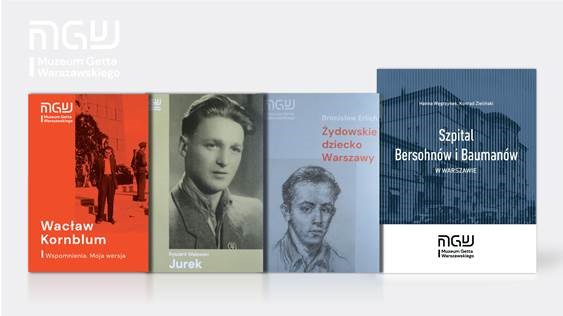The Warsaw Ghetto. Places and people – a meeting promoting WGM’s publications
The Museum of the Warsaw Ghetto, as part of the Singer Festival and in cooperation with the National Film Archive – Audiovisual Institute, invites you to a meeting “The Warsaw Ghetto. Places and People”, dedicated to the memories of Holocaust survivors and published by the Museum.
“Bersohn and Bauman Children’s Hospital” – Dr. Hanna Węgrzynek, Prof. Konrad Zieliński
The first publication of the Museum is an album dedicated to the Bersohn and Bauman Children’s Hospital. The publication by Dr. Hanna Węgrzynek, Deputy Director of the Warsaw Ghetto Museum, and Prof. Konrad Zieliński, Scientific and Research Department, presents the history of the Bersohn and Bauman Children’s Hospital as an important testimony to the history of Warsaw Jews and the Warsaw Ghetto. In 2019, the album was published in two language versions – Polish and English – in 300 copies of each.
“Memories. My Version” – Wacław Izaak Kornblum
Published in 2019, it opens a series of personal retrospections. The protagonist (born in 1926) grew up in 1930s Warsaw. At that time, he lived at 42 Śliska Street, near the Bersohn and Bauman Children’s Hospital. He attended a nursery school operating under the auspices of the Bund, then a Bund school at 36 Krochmalna Street. Just before the war broke out, the whole family moved to 35 Niska Street. Izaak Kornblum was thirteen at the time. His memories constitute an emotional story about the diversity of life of Jews in pre-war Warsaw, Polish and Jewish relations during the occupation, hiding and survival, and finally about the post-war history of the Survivors. Today, Wacław Kornblum is a Member of the Board of Trustees of the Warsaw Ghetto Museum.
“Jurek” – Ryszard Walewski
The memoirs by Ryszard Walewski, dedicated to his best friend Jurek Płonski and other insurgents from the Warsaw Ghetto, is a personal story about the German occupation, the uprising in the ghetto, the hardships of hiding on the Aryan side, the daily struggle for survival and the post-war fate of “Jurek” – Dawid. It is a multifaceted narrative from two perspectives, in which Płoński’s account is interwoven with memories of Ryszard Walewski, the participant in two uprisings: the Warsaw Ghetto Uprising and the Warsaw Uprising. In 1976, five years after Ryszard Walewski’s death, through the efforts of his family and Jerzy Płoński, the first edition of “Jurek” was published in Hebrew by the Moreszet Publishing House in Tel Aviv. The task of compiling his father’s archive was undertaken by Prof. Avi Valevski. The 2020 edition was prepared and compiled in scientific terms by a team of Warsaw Ghetto Museum historians.
“The Jewish Child of Warsaw” – Bronisław Erlich
Bronisław Erlich’s excellent book, first published in 2006 and until recently practically unavailable, was published in a second, expanded edition thanks to the Museum in 2021. Erlich’s fate is recalled by the director and documentary filmmaker Łukasz Korwin, who, in 2019, recorded the memories of the then 97-year-old hero. Bronisław Erlich was born in Warsaw in 1923. He escaped with his sister from Nalewki Street at the end of 1939. They went east, to Białystok, Brześć and then to Wołkowysk, where he worked for a retired Polish Army officer. When the deportation of local Jews to the Treblinka death camp began, he had to flee further. Under an assumed identity, he was sent to work in Thuringia. He survived because of his courage, ability to make quick decisions, and the luck that favoured him in those inhuman times. He witnessed different attitudes. However, this story would not have had a happy ending if not for the many people who aided him in successfully reaching a safe destination. The protagonist leaves a clear message – what happened during the Second World War must never happen again.
The meeting will be held on Friday, August 27 at 6:00 pm in the Promised Land Room at the National Film Archive – Audiovisual Institute, 3/5 Wałbrzyska St. Admission is free.
Safety rules
We do everything possible to ensure your safety at FINA events. Therefore, please observe the following rules:
- see FINA’s rules for participation in public events at www.fina.gov;
- be sure to print out the mandatory health declaration, which can be found at www.fina.gov, the declaration is also available at FINA headquarters;
- remember to cover your mouth and nose when on FINA premises;
- the checkroom is closed until further notice;
- keep your distance from other guests- take the place assigned by the FINA staff;
- it is forbidden to bring food and drinks into the audiovisual room;
- if you have symptoms of infection, stay at home.
If you have any questions or doubts, please contact the reception at bog@fina.gov.pl or by phone: 22 380 49 95 (from Tue to Fri from 9 am to 5 pm).

